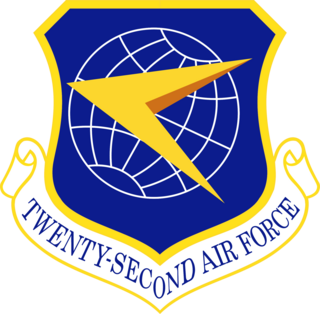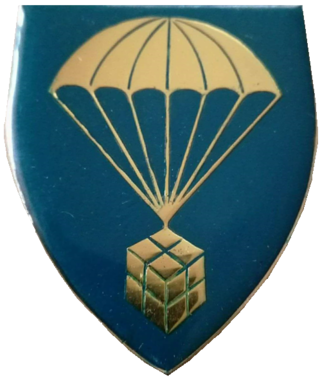
Twenty-Second Air Force is a Numbered Air Force component of Air Force Reserve Command (AFRC). It was activated on 1 July 1993 and is headquartered at Dobbins Air Reserve Base, Georgia.

The South African Defence Force (SADF) comprised the armed forces of South Africa from 1957 until 1994. Shortly before the state reconstituted itself as a republic in 1961, the former Union Defence Force was officially succeeded by the SADF, which was established by the Defence Act of 1957. The SADF, in turn, was superseded by the South African National Defence Force in 1994.

The 47th Infantry Division was a formation of the United States Army active from 1946 to 1991. It was provided by the Army National Guard. The division was created on 10 June 1946 as a National Guard infantry division from the efforts of Minnesota's Adjutant General Ellard Walsh. The division was built from scratch with veteran transfers and new recruits, mostly from Minnesota and North Dakota, under the command of Major General Norman Hendrickson. General Hendrickson was the Chief-of-Staff for the 34th Division in the North African and Italian campaigns in 1943 and the IX Corps in occupied Japan.

The 1st Combat Communications Squadron is a military communications unit of the United States Air Force. It is part of the 435th Air Ground Operations Wing, United States Air Forces in Europe. It is located at Ramstein Air Base, Germany.
The 24th Georgia Infantry Regiment was an infantry regiment in the Confederate States Army during the American Civil War. The regiment was part of Thomas Cobb's brigade at the Battle of Fredericksburg.

Combat Logistics Regiment 27 is a logistics regiment based at Marine Corps Base Camp Lejeune, North Carolina and falls under the command of the 2nd Marine Logistics Group and the II Marine Expeditionary Force, United States Marine Corps.

The United States Air Force's 269th Combat Communications Squadron is an Ohio Air National Guard combat communications unit located at Springfield Air National Guard Base, Ohio.

The 67th Missile Squadron is an inactive United States Air Force unit. It was last assigned to the 44th Operations Group, stationed at Ellsworth AFB, South Dakota.

3 South African Infantry Battalion is the Basic training unit of the South African Army.
2 Reconnaissance Regiment was the Active Citizen Force unit of the South African Special Forces. Its part-time service personnel formed part of the reserve component of the South African Defence Force.

The South African Infantry School is within the Army Base in Oudtshoorn, Western Cape. The Infantry School, now at Oudtshoorn, was established in November 1953, after a history dating back to the South African Military School in Bloemfontein, established in 1912. It is the Infantry’s “centre of excellence” and offers a number of infantry-specific courses to regulars and Reservists.

The 101 Air Supply Unit is a parachute unit of the South African Ordnance Services Corps. Formed in 1963, it has supported the 44 Parachute Brigade, now the 44 Parachute Regiment, since its establishment. It appears to be based at Lyttelton, Gauteng.

The Witwatersrand Command was a Command of the South African Army. It was one of the ten regional commands, which, with the Walvis Bay Military Area, made up the Territorial Force.

7 South African Infantry Division was a formation of the South African Army, active from the 1960s to 1999.

6 Medical Battalion Group is a Medical Battalion in the South African Military Health Service (SAMHS). SAMHS is the fourth Arm of Service of the South African National Defence Force (SANDF).

Hillcrest Commando was a light infantry regiment of the South African Army. It formed part of the South African Army Infantry Formation as well as the South African Territorial Reserve. Hillcrest was a Commando from 1962 to 1983 and was the first English commando in Pretoria. Hillcrest was however a Regiment from 1983 to 2003.

Johannesburg East Commando was a light infantry regiment of the South African Army. It formed part of the South African Army Infantry Formation as well as the South African Territorial Reserve.

16 Reception Depot was an administrative unit of the Personnel Service Corps of the South African Army.

Wemmerpan Commando was a light infantry regiment of the South African Army. It formed part of the South African Army Infantry Formation as well as the South African Territorial Reserve.


















